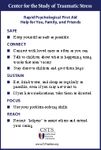Israel-Hamas War Mental Health Resources
Exposure to acts of terrorism and war causes a wide range of harmful mental health effects. Those working with people directly impacted by the Israel-Hamas war or affected communities around the world can protect mental health by using the following evidence-based actions and other resources below:
- Ensure physical safety and the safety of treasured belongings people may bring (e.g., locked trunks).
- Connect people to loved ones whenever possible to enhance support.
- Use culturally sensitive calming techniques to help lower stress.
- Be alert to usual illnesses present in populations – from diabetes to hypertension to schizophrenia – and ensure care is provided.
- Remain aware and sensitive to trauma history as this may exacerbate negative response or distress.
- Be present for children and provide explanations to their questions, but do not overload them with frightening information.
- Helping people with problem-solving is a form of caring that reminds them of their own strengths and abilities.
- Recruit "helpers" to assist others and have them extend your ability to deliver care.
No permission is needed to use or adapt the public domain content below from the Center for the Study of Traumatic Stress. You may use and share it freely.
Pocket Cards
|
Rapid Psychological First Aid: |
Click HERE for all versions of Rapid Psychological First Aid: Help for You, Family, and Friends
Click HERE for all versions of Helping Others Calm an Acute Stress Response
Education fact sheets are below that help children and families, healthcare workers, humanitarian aid personnel, as well as community and military leaders to protect mental health and foster recovery during armed conflict:
Children and Families
Helping Children Understand Frightening Events
Managing the Stress of Children after a Crisis
Helping Children Cope During Deployment
Teachers Helping Students during War and other Disasters
Advancing the Health of Military Families During Deployment
Post Disaster Stress Management for Parents
Managing the Stress of War and Disaster
Reconnecting with Your Spouse or Partner after Military Deployment
Understanding Combat Stress to Help Your Loved One
How to Get a Service Member to Seek Help after Combat
Caring for Your Family after a Service Member's Traumatic Brain Injury
Military, Healthcare, and Aid Workers
Sustaining the Well-Being of Caregivers While Helping Victims of War
Optimizing Sleep in an Operational Environment: A Guide for Service Members
Information for Responders on Emotional Reactions to Human Remains
How Healthcare Providers Can Help Service Members Seek Care
Notifying Family Members after Unexpected Deaths: Guidance for Healthcare Providers
Caring for Combat Injured Families: Principles for Healthcare Professionals
How Healthcare Providers Can Help Families after a Service Member's Traumatic Brain Injury
Community and Military Leaders
Guidelines for Leaders on Notifying Family of Dead or Missing Loved Ones
Grief Leadership to Promote Sustainment and Recovery During War
Military Leadership During Stressful Situations
Leadership Communication for Anticipating and Responding to Stressful Events
Educational Training Videos
Psychological first aid to military
Leadership behaviors in war and disasters
Additional Resources
iCover
Stop the Bleed
National Child Traumatic Stress Network
Age-Related Reactions to a Traumatic Event
Assisting Parents/Caregivers in Coping with Collective Trauma
Talking to Children: When Scary Things Happen
Talking to Teens: When Scary Things Happen
Creating Supportive Environments: When Scary Things Happen
Sesame Workshop
Walter Reed Army Institute of Research
Sustaining Mental Readiness in the Context of Prolonged Stress (WRAIR)
Sleep in High Stress Environments (WRAIR)
Mobile Apps
Psychological First Aid Mobile App (iPhone and Android)








